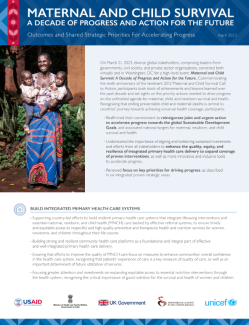Maternal and Child Survival: A Decade of Progress and Action for the Future
Outcomes and Shared Strategic Priorities for Accelerating Progress
fact sheet
On March 21, 2023, diverse global stakeholders, comprising leaders from governments, civil society, and private sector organizations, convened both virtually and in Washington, DC for a high-level event: Maternal and Child Survival: A Decade of Progress and Action for the Future. Commemorating the tenth anniversary of the landmark 2012 Maternal and Child Survival Call to Action, participants took stock of achievements and lessons learned over the past decade and set sights on the priority actions needed to drive progress on the unfinished agenda for maternal, child, and newborn survival and health. Recognizing that ending preventable child and maternal deaths is central to countries’ journey towards achieving universal health coverage, participants:
Reaffirmed their commitment to reinvigorate joint and urgent action to accelerate progress towards the global Sustainable Development
Goals, and associated national targets for maternal, newborn, and child survival and health.
Underscored the importance of aligning and bolstering sustained investments and efforts from all stakeholders to enhance the quality, equity, and resilience of integrated primary health care delivery to expand coverage of proven interventions, as well as more innovative and inclusive tools to accelerate progress.
Renewed focus on key priorities for driving progress, as described in six integrated proven strategic areas.
BUILD INTEGRATED PRIMARY HEALTH CARE SYSTEMS
- Supporting country-led efforts to build resilient primary health care systems that integrate lifesaving interventions and essential maternal, newborn, and child health (MNCH) care backed by effective referral systems, to ensure timely and equitable access to respectful and high-quality preventive and therapeutic health and nutrition services for women, newborns, and children throughout their life-course.
- Building strong and resilient community health care platforms as a foundational and integral part of effective and well-integrated primary health care delivery.
- Ensuring that efforts to improve the quality of MNCH care focus on measures to enhance communities’ overall confidence in the health care system, recognizing that patients’ experience of care is a key measure of quality of care, as well as an important determinant of future utilization of services.
- Focusing greater attention and investments on expanding equitable access to essential nutrition interventions through the health system, recognizing the critical importance of good nutrition for the survival and health of women and children.
REACH THE HARDEST TO REACH WOMEN AND CHILDREN
Supporting country-led efforts to build resilient primary health care systems that integrate lifesaving interventions and essential maternal, newborn, and child health (MNCH) care backed by effective referral systems, to ensure timely and equitable access to respectful and high-quality preventive and therapeutic health and nutrition services for women, newborns, and children throughout their life-course.
Building strong and resilient community health care platforms as a foundational and integral part of effective and well-integrated primary health care delivery.
Ensuring that efforts to improve the quality of MNCH care focus on measures to enhance communities’ overall confidence in the health care system, recognizing that patients’ experience of care is a key measure of quality of care, as well as an important determinant of future utilization of services.
CATALYZE SUSTAINED COUNTRY COMMITMENT AND MUTUAL ACCOUNTABILITY
- Fostering sustained country leadership and domestic resource allocations to expand coverage and equitable access to quality maternal, newborn, and child health services as an integral part of universal health coverage for all.
- Enhancing collaboration across sectors (e.g., water, sanitation and hygiene, nutrition, livelihoods, education, and climate) to build resilient health systems capable of withstanding health crises, environmental challenges, and other shocks.
- Reinforcing clear targets and accountability measures at global, national, and local levels for all stakeholders to track and monitor progress on improving the quality, equitable delivery, and coverage of essential services.
- Engaging local communities and civil society organizations in monitoring and reporting on the delivery of maternal, newborn, and child services.
INVEST IN PRIMARY HEALTH CARE WORKERS
Prioritizing health workforce planning, management, regulatory measures, and sustained investments to build a skilled, diverse health workforce of adequately equipped and compensated nurses, midwives, community health workers, and
other health professionals that provide vital care for women, newborns, and children.Strengthening and institutionalizing the community health workers cadre and investing in high quality professional training for all essential MNCH cadres to improve skills and retention and expand the MNCH workforce.
Fostering the engagement of MNCH cadres in the governance of primary health care delivery at the community and facility levels, including prioritizing efforts to improve their work environments and retain skilled health care providers.
PRIORITIZE LOCAL LEADERSHIP AND SOLUTIONS
Engaging local communities, including women and girls, local civil society organizations, and faith-based groups in the design and implementation of MNCH programs and services.
Foster local leadership in the identification of service delivery bottlenecks, as well as innovative and inclusive solutions to address them, to ensure that programs are responsive to local priorities, harness and enhance local capacities and resources, and remain accountable to local communities.
GENERATE AND USE DATA, EVIDENCE, AND LEARNING FOR DECISION-MAKING
- Strengthening capacities at subnational and local levels for generating, accessing, analyzing, and using disaggregated data of improved quality, timeliness, and reliability to improve the coverage, equity, and quality of high-impact MNCH interventions and to adaptively manage and mitigate disruptions in essential services.
- Leverage digital tools and technologies, appropriate to country contexts and aligned with national digital health strategies, to improve the quality, cost-effectiveness, and timeliness of primary health care services for women, newborns, and children.

